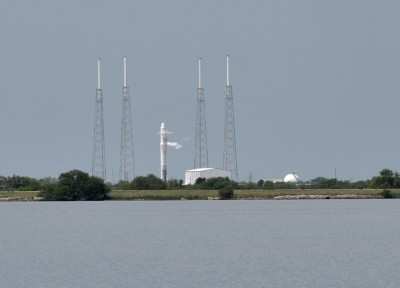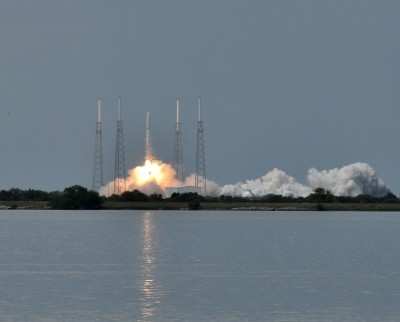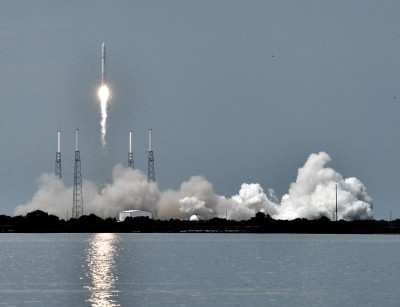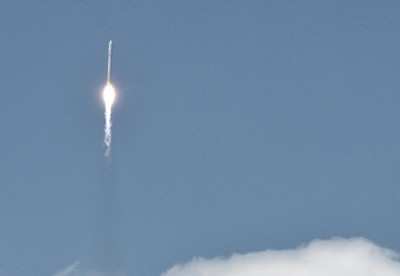Liftoff Came 15 Minutes Before The Launch Window Closed
The day was not without its drama, but just minutes before the
launch window closed, SpaceX moved a giant step closer to
commercial re-supply of ISS, and boosted the fortunes of the
commercial space industry literally into orbit.

Falcon 9 On Launch Pad Just Prior To Launch
The launch can't be seen as anything other than an unqualified
success, but it was a day of delays. First, there was the weather,
and then a telemetry issue with the vehicle destruct system pushed
the launch into the afternoon. That problem was no sooner resolved
than a small sailboat strayed into the launch safety range, causing
it to go red again. Finally, at shortly after one, the countdown
resumed.
But at T- :02 seconds, the launch was aborted, as an engine
parameter fell out of its nominal range.
The rocket scientists at SpaceX worked through that problem with
the launch window deadline looming. The countdown resumed about
1430, and 15 minutes later, Falcon 9 rumbled, and lifted into the
sky on her way to orbit. A SpaceX spokesperson said the second
stage separated and ignited perfectly, and orbit was achieved at
around 1454 EDT. SpaceX said nominal shutdown and orbit was almost
exactly 250km. Telemetry showed essentially a bullseye: ~0.2%
on perigee and ~1% on apogee.

The Falcon 9 launch shows what Americans can do when presented
with a challenge. In a conference call Thursday, SpaceX CEO Elon
Musk had given the launch about a 75 percent chance of success, in
a way managing expectations by reminding reporters that most first
rocket launches were less than perfect. But from where we stood on
the causeway across from launch complex 40 at Cape Canaveral, it
appeared that SpaceX has made enormous strides towards backing
up their claim that commercial rockets are the future of space
exploration.
Congratulations came in quickly. NASA Administrator Charles
Bolden said in a statement: "Congratulations to Space X on today's
launch of its Falcon 9 launch vehicle. Space X's accomplishment is
an important milestone in the commercial transportation effort and
puts the company a step closer to providing cargo services to the
International Space Station.

"Preparations are proceeding for the first NASA-sponsored test
launch under the Commercial Orbital Transportation Services project
later this year. COTS is a vital development and demonstration
partnership to create a commercial space transportation system
capable of providing cargo to the station.
"This launch of the Falcon 9 gives us even more confidence that
a resupply vehicle will be available after the space shuttle fleet
is retired."
Bretton Alexander, President of the Commercial Spaceflight
Federation, said "Today is a historic day for SpaceX. The
Falcon 9 rocket rising into the sky was carrying the hopes and
dreams of the hundreds of engineers who worked on this new
project. And I know that thousands of well-wishers across the
country were cheering that rocket on. For a brand-new rocket
to accomplish this much on its first mission is truly impressive,
given the historical difficulties of first flights."
Dr. Peter H. Diamandis, Chairman of the X PRIZE Foundation, said
"In President Barack Obama's new plan for NASA, a new player has
taken center stage - American capitalism and entrepreneurship - and
today's SpaceX launch strengthens my hope that commercial space
companies will at long last remove the cost barrier that slows our
exploration of the solar system."

And from Frank DiBello, President and CEO of Space Florida:
"This is another giant leap forward on the path of commercial
spaceflight. Florida's aerospace workforce can take special
pride that SpaceX's launch happened right here at Cape
Canaveral. This success means more jobs for Florida and
Floridians, and this success also means a major new force in the
evolution of a vibrant commercial space capability for the
nation."
SpaceX plans to carry non-critical supplies to ISS in the near
future, and Friday's success makes that scenario look a lot more
plausible.
 1st Annual Affordable Flying Exposition Gets Its Footing
1st Annual Affordable Flying Exposition Gets Its Footing Aero-News: Quote of the Day (11.04.25)
Aero-News: Quote of the Day (11.04.25) Aero-News: Quote of the Day (11.05.25)
Aero-News: Quote of the Day (11.05.25) Airborne 10.30.25: Earhart Search, SpaceX Speed Limit, Welcome Back, Xyla!
Airborne 10.30.25: Earhart Search, SpaceX Speed Limit, Welcome Back, Xyla! ANN's Daily Aero-Linx (11.05.25)
ANN's Daily Aero-Linx (11.05.25)






